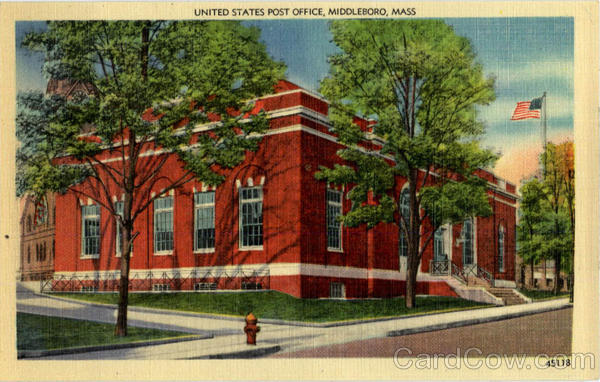The US Postal Service as a business model isn’t looking so bad now, is it?
Why Should I Care: Nationalization
Courtesy of Minyanville
Just thinking about the post office can give you the willies: Its mind-numbingly drab interior, the lines upon lines of automatons shuffling blankly along, hoping that the edgy folks on the other side of the counter don’t give credence to that whole "going postal" idea.
Now, if you will, imagine you’re waiting in that same line to withdraw money from the bank.
Yikes.
Nationalization is a creepy concept in this country, especially when the most common contact we have with a state-run institution is, for the fortunate, the US Postal Service; for the unfortunate, it’s the IRS.
Nationalization is a simple idea really: It’s when the government takes ownership of an industry or other private assets. 
Take the Department of Homeland Security, for example: After September 11, the airport-safety industry was relieved of its responsibility to keep the skies free of maniacal would-be terrorists. To be sure, there hasn’t been another attack, but flying is downright miserable thanks to long lines, redundant inspections and queues of unmanned metal detectors on light travel days like the Wednesday before Thanksgiving and 4th of July weekend.
Recently, with the near-collapse of the banking and automotive sectors, the subject of nationalization has once again reared its controversial head.
Advocates of the free market argue that General Motors (GM), Chrysler and Ford (F) should be allowed to fail, if that is indeed their destiny. Others contend the government should seize control of the firms, toss out their incompetent management teams, and start making cars people actually want to drive.
 The question, of course, is whether fire-breathing bureaucrats would succeed where private businessmen failed.
The question, of course, is whether fire-breathing bureaucrats would succeed where private businessmen failed.
We may never know, as the current course of action seems to be a bastardized version of nationalization, in which government offers up tens of billions of dollars in cheap loans in exchange for some miracle turnaround strategy that may or may not materialize. Meanwhile, it offers gentle suggestions of exactly what kind of cars these “private” corporations should make.
The banking system, which some say has already been effectively nationalized, is even trickier.
And the problem extends beyond choosing a name for this would-be all-American bank (Bank of America (BAC), US Bancorp (USB) and BankUnited (BKUNA) are all taken). Today’s financial institutions are so exceedingly complex that it’s doubtful politicians — most of whom couldn’t explain the difference between a CD that plays and a CD that pays — could manage banks successfully.
Last September, however, things got so bad in the mortgage market that the Treasury Department nationalized Fannie Mae (FNM) and Freddie Mac (FRE), by far the 2 biggest home lenders in the country. To be fair, Fannie and Freddie had been half-breed not-quite-private-not-quite-public entities for years – but ballooning losses as the housing market collapsed made their nationalization downright inevitable.
As if practical matters aren’t contentious enough, the ideological debate surrounding nationalism is just as touchy.
Government control of the means of production is a fundamental tenet of most socialist doctrines, as is the belief that bureaucrats do a better job of equitably distributing wealth than do private corporations. By owning a part of the major industries, they argue, the common man actually has more control over his economic well-being than he does in a capitalist system. 
And while evidence to the contrary abounds – especially in the United States — not all nationalization is bad.
Take again our friends at the USPS. The Constitution actually laid the foundation for a national mail delivery service, granting Congress the power to “establiash post offices and post roads."
Imagine the alternative: If the postal service were to be privatized (the opposite of nationalization, where the government sells off an industry to the private sector), mail service charges would all of a sudden be set by the market.
Sure, letters would arrive in the calendar year during which they were sent, but folks in rural areas would be unduly penalized for living in remote locales: It’s a lot more expensive to send a letter from San Diego to Bangor, Maine than it is up the coast to Long Beach.
The wisdom of a nationalized postal service makes sense when you think back to a time when mail was delivered on horseback, and charging a market rate would have effectively cut off large swaths of the populace from an economically feasible means of communication. Although email is well on its way to rendering mail delivery obsolete, the principal still holds; few would argue we should start charging more for sending letters across country than to a few towns over.
Conservatives, historically opposed to government intrusion into private business, are apt to squawk that President Barack Obama is an outright socialist, hell-bent on nationalizing any industry he can get his hands on. Last December, however, Obama himself expressed a wariness about federal takeovers: “We don’t want government to run companies. Generally, government historically hasn’t done very well.” 
Still, he may not have much choice.
The only unwavering truth since the day we were forced to learn what a subprime loan was — and that the pillars of our financial infrastructure had been giving them out like candy on Halloween — has been that the financial crisis continues to get worse faster than almost anyone expected.
Following that logic through, we may find ourselves tapping away at our iPods and BlackBerries in line at the Federal National Bank of the United States of America in the not-too-distant future.


